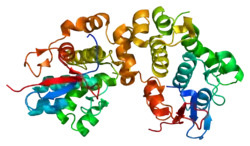Naxos syndrome
| Naxos disease | |
|---|---|
| Other names: Diffuse non-epidermolytic palmoplantar keratoderma with woolly hair and cardiomyopathy | |
 | |
| Cutaneous phenotype of Naxos disease: woolly hair (A), palmar (B) and plantar (C) keratoses. | |
Naxos disease (also known as "diffuse non-epidermolytic palmoplantar keratoderma with woolly hair and cardiomyopathy,"[1] "diffuse palmoplantar keratoderma with woolly hair and arrhythmogenic right ventricular cardiomyopathy, first described on the island of Naxos by Nikos Protonotarios,"[1] and "Naxos disease"[1]) is a cutaneous condition characterized by a palmoplantar keratoderma.[1] The prevalence of the syndrome is up to 1 in every 1000 people in the Greek islands.[2]
It has been associated with mutations in the genes encoding the proteins desmoplakin, plakoglobin, desmocollin-2, and SRC-interacting protein (SIP).[3][4] A variation of Naxos syndrome is known as Carvajal syndrome.[2]
Symptoms and signs

Between 80 and 99% of those with Naxos disease will display some of the following symptoms:r[5]
- Disease of the heart muscle
- Thickening of palms and soles
- Sudden increased heart rate
- Dizzy spells
- Kinked hai
- Cardiomegaly
- Dilated cardiomyopathy
- Detachment of nail
- Sparse body hair
Cause

The desmosomal proteins plakoglobin and desmoplakin take on mutations that cause Naxos disease. [6]
Increased mechanical stress leads to cell death, due to defects in linking sites of plakoglobin and desmoplakin which can interrupt series of cell adhesion[6]
Management
The treatment for this condition is based on the following:[6]
- Automatic cardioverter defibrillator
- Antiarrhythmic drugs
- Heart transplantation
See also
References
- 1 2 3 4 Rapini, Ronald P.; Bolognia, Jean L.; Jorizzo, Joseph L. (2007). Dermatology: 2-Volume Set. St. Louis: Mosby. ISBN 978-1-4160-2999-1.
- 1 2 Protonotarios, Nikos; Tsatsopoulou, Adalena (2006). "Naxos disease: Cardiocutaneous syndrome due to cell adhesion defect". Orphanet Journal of Rare Diseases. 1 (1): 4. doi:10.1186/1750-1172-1-4. PMC 1435994. PMID 16722579.
- ↑ McKoy G, Protonotarios N, Crosby A, et al. (June 2000). "Identification of a deletion in plakoglobin in arrhythmogenic right ventricular cardiomyopathy with palmoplantar keratoderma and woolly hair (Naxos disease)". Lancet. 355 (9221): 2119–24. doi:10.1016/S0140-6736(00)02379-5. PMID 10902626. S2CID 39821701.
- ↑ "Keratoderma with woolly hair". Genetics Home Reference. April 17, 2018. Archived from the original on April 18, 2018. Retrieved April 17, 2018.
- ↑ "Naxos disease | Genetic and Rare Diseases Information Center (GARD) – an NCATS Program". rarediseases.info.nih.gov. Archived from the original on 2021-03-18. Retrieved 2021-04-04.
- 1 2 3 RESERVED, INSERM US14-- ALL RIGHTS. "Orphanet: Naxos disease". www.orpha.net. Archived from the original on 21 November 2017. Retrieved 22 August 2021.
External links
| Classification |
|---|